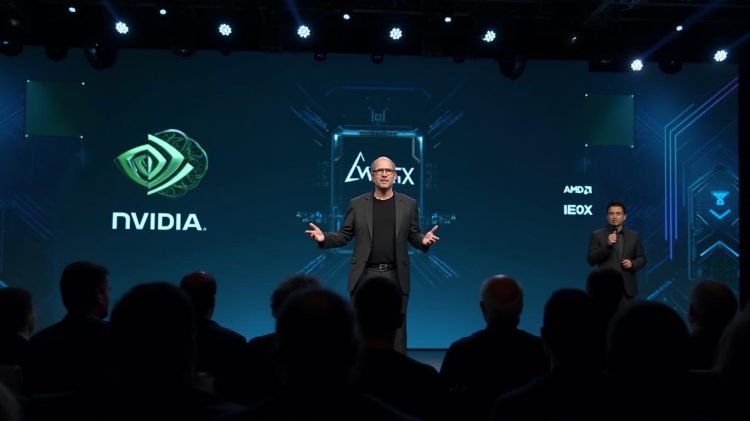The Relentless Rise of Nvidia: What’s Behind the Surge?
Nvidia’s meteoric rise over the past 18 months has become one of the most defining narratives in global financial markets. With shares surging more than 300%, the GPU giant has cemented itself not only as a dominant player in semiconductors but as the poster child of the artificial intelligence revolution. Its market cap now rivals that of entire nations’ GDPs, and bulls argue it is still early in a multi-year secular growth cycle. But with such a steep ascent, investors are right to ask—what’s truly driving the rally, and how sustainable is it?
First and foremost, Nvidia’s performance is fueled by explosive demand for AI chips—specifically its H100 and upcoming Blackwell GPUs. The H100 has become the backbone of virtually every major AI compute cluster on the planet, from OpenAI and Meta to Microsoft Azure and Amazon AWS. Generative AI training models require immense parallel processing power, and Nvidia’s CUDA ecosystem, combined with its superior silicon, makes it the default choice. Analysts estimate that more than 80% of all AI server deployments in 2024 included Nvidia chips.
Nvidia’s data center revenue now eclipses its gaming segment by a wide margin, and it’s not just hyperscalers buying in. Sovereign AI projects in Saudi Arabia, UAE, and South Korea are placing bulk orders, while traditional enterprises—from pharma to logistics—are building internal LLM teams and ramping capex for GPU infrastructure. The company is operating in a global gold rush where it is the shovel provider—and currently the only one with the shovels ready to ship.
AI Chip Demand vs. Supply Chain Bottlenecks
Yet even as demand hits fever pitch, Nvidia is constrained by supply—especially in the cutting-edge packaging technologies needed for its GPUs. Each H100 chip requires advanced CoWoS (Chip-on-Wafer-on-Substrate) packaging, a capability dominated by TSMC with very limited global capacity. This has led to long lead times and tight allocations, giving Nvidia unprecedented pricing power but also creating execution risk.
The 2025 launch of the Blackwell architecture is expected to alleviate some of this pressure. Blackwell promises 2x the performance of H100s at lower power consumption, and early reports from insiders suggest that Google and Microsoft are already testing prototypes in R&D environments. However, full-scale adoption is not expected until late 2025, with meaningful volume deployments likely in early 2026. That creates a potential air pocket where demand could briefly outpace Nvidia’s ability to fulfill orders.
The bottleneck extends beyond foundry capacity. Global shortages in high-bandwidth memory (HBM), essential for Nvidia’s GPUs to achieve maximum throughput, have also been reported. Suppliers like SK Hynix and Micron are rushing to increase capacity, but the capital-intensive nature of this segment means tight supply could persist through year-end. Furthermore, the global push for AI sovereignty—where countries want to build their own GPU clusters instead of relying on U.S.-based cloud firms—is creating parallel channels of demand that are hard to predict or manage.
These constraints have paradoxically fueled Nvidia’s rally. Limited supply has led to chip shortages, which in turn have driven up margins and ASPs (average selling prices), improving profitability even faster than revenue. Nvidia’s gross margin has consistently beaten estimates, exceeding 76% in its latest quarterly earnings. But this level of profitability is rare in hardware and is drawing intense scrutiny from both investors and competitors.
Blackwell GPU Adoption and Competitive Landscape
The Blackwell GPU family represents Nvidia’s next big bet on retaining AI dominance. Built on TSMC’s 4NP process and featuring breakthroughs in interconnect architecture, Blackwell chips are designed to scale LLMs with trillions of parameters—offering better memory bandwidth, energy efficiency, and software compatibility with Nvidia’s CUDA stack. Early testing suggests that Blackwell-based systems could halve the training time of frontier models while reducing power draw by 30%, a game-changer in the cost calculus of AI training.
Key hyperscalers have already lined up. Microsoft and Google are building new data centers optimized for Blackwell thermal loads. Oracle and CoreWeave have announced plans to allocate multi-billion-dollar budgets toward Blackwell infrastructure in 2026. Elon Musk’s xAI reportedly secured a priority allocation deal with Nvidia to train its Grok models on Blackwell clusters. Meanwhile, Nvidia’s DGX Cloud—a subscription AI infrastructure product—will soon incorporate Blackwell in its as-a-service model, creating another monetization layer.
Still, Nvidia is no longer alone in the race. AMD’s MI300X series is gaining traction among open-source AI developers, while Intel’s Gaudi platform has secured several wins in Asia. The biggest competitive threat, however, comes from Nvidia’s own customers. Amazon’s Trainium, Google’s TPU v5, and Microsoft’s Maia chips are examples of vertical integration attempts aimed at reducing dependency on Nvidia. If these efforts succeed in matching Nvidia’s performance at lower costs, margin pressure could emerge by late 2026.
But for now, Nvidia retains the software moat. CUDA, TensorRT, and its AI software ecosystem make switching costs prohibitively high. AI engineers are trained on Nvidia platforms, and enterprise AI pipelines are deeply intertwined with its APIs. While hardware alternatives exist, the full-stack solution Nvidia offers remains unmatched—at least in the near term.

Short-Interest, Valuation Warnings, and Institutional Bets
Despite Nvidia’s upward trajectory, not everyone is convinced the party can last. Short interest in Nvidia stock remains elevated relative to its mega-cap peers. While it has declined from its 2024 peak, roughly 1.2% of Nvidia’s float remains shorted—a large number given its $3 trillion market cap. Some hedge funds are betting that Nvidia’s earnings multiples are unsustainable and that competition and supply constraints will eventually erode its edge.
Valuation remains the most cited concern. Nvidia is trading at over 40x forward earnings—a level reminiscent of late-1990s tech darlings. Bulls argue this is justified given 90%+ revenue growth and dominant market share in a once-in-a-generation tech shift. Bears counter that any hiccup—whether supply-related, geopolitical, or competitive—could trigger a severe derating. The memory of Cisco in 2000 or Intel in 2021 looms large, where leadership failed to prevent valuation crashes once sentiment turned.
Still, institutional flows suggest growing conviction. Vanguard and BlackRock continue to add Nvidia shares, while several sovereign wealth funds have significantly increased exposure in 2025. Options activity also shows bullish skew, with open interest favoring call spreads across 18-month maturities. Ark Invest and T. Rowe Price have publicly stated that Nvidia forms the core of their AI exposure due to its “AI infrastructure” status. As such, the debate is no longer about whether Nvidia will remain relevant—but how much of the future AI boom is already priced in.
What Investors Should Watch Next
Looking ahead, investors should monitor several key variables. First, keep an eye on Blackwell production timelines and whether TSMC can meet Nvidia’s demand at scale. Delays could compress guidance in early 2026 and spook high-momentum investors. Second, track adoption metrics among cloud providers—particularly whether AMD or in-house chips begin taking share in inference workloads.
Third, regulatory risk is growing. With Washington already curbing Nvidia’s exports of top-tier chips to China, there’s concern that future restrictions could extend to the Middle East or other geopolitical hotspots. Any escalation here could dent revenue forecasts materially. Fourth, competition from open-source LLMs and alternative architectures (like Cerebras or Groq) could also shift industry dynamics away from Nvidia’s current hardware-centric model.
Finally, don’t ignore macro. A sharp Fed pivot, rate hikes, or global recession could dent corporate AI spending and slow infrastructure deployments—though Nvidia’s backlog and secular story offer some cushion.
Conclusion: Overvalued, Overloved—Or Underestimated?
Nvidia is arguably the most important stock in the market today. It sits at the intersection of every major trend—AI, semiconductors, geopolitics, and Big Tech capex. Its rally has been driven by real earnings, dominant market share, and a clear roadmap of future products. Yet, its astronomical rise has also priced in near-perfection.
Is it overvalued? Perhaps. But it may also be underestimated. Nvidia is not just a chipmaker—it is becoming the utility provider of the AI age. As long as global demand for AI training grows and its ecosystem remains sticky, Nvidia has a long runway. However, investors must be prepared for volatility. Stocks that go vertical rarely stay calm, and the road from here will be defined by execution, not enthusiasm.
The best approach may be partial exposure with tactical trimming on parabolic moves—own the leader, but with discipline. In the new AI arms race, Nvidia is not just running—it is setting the pace.












































